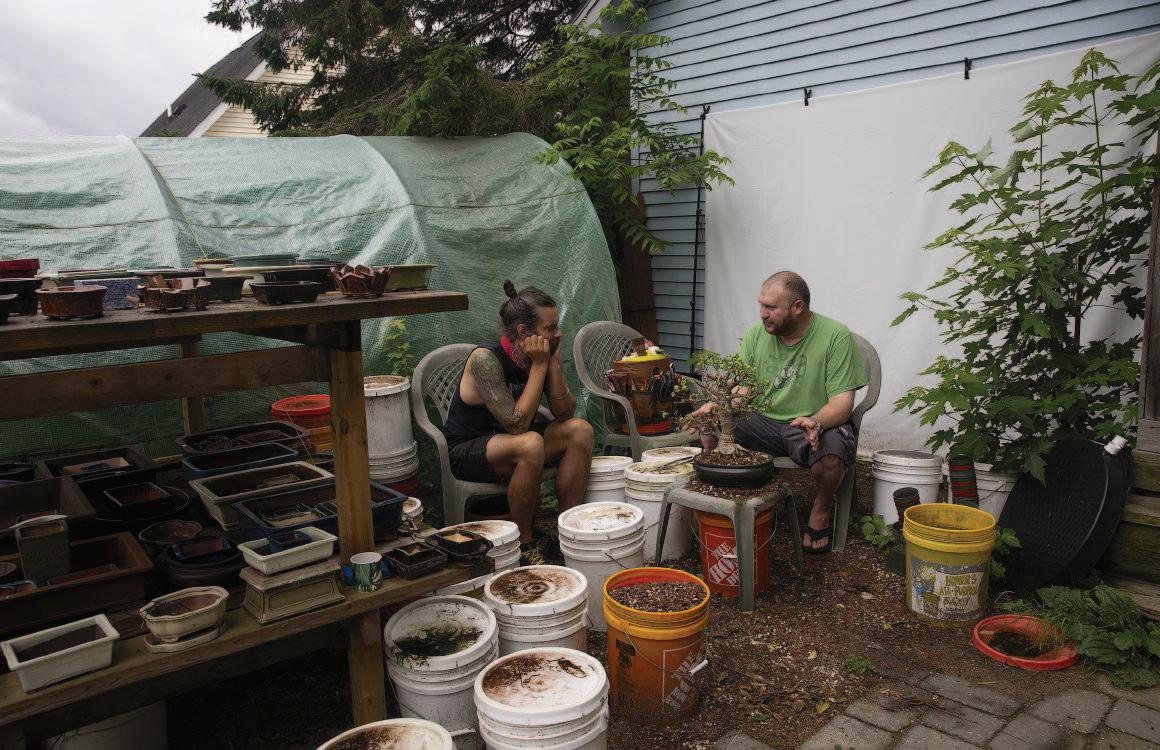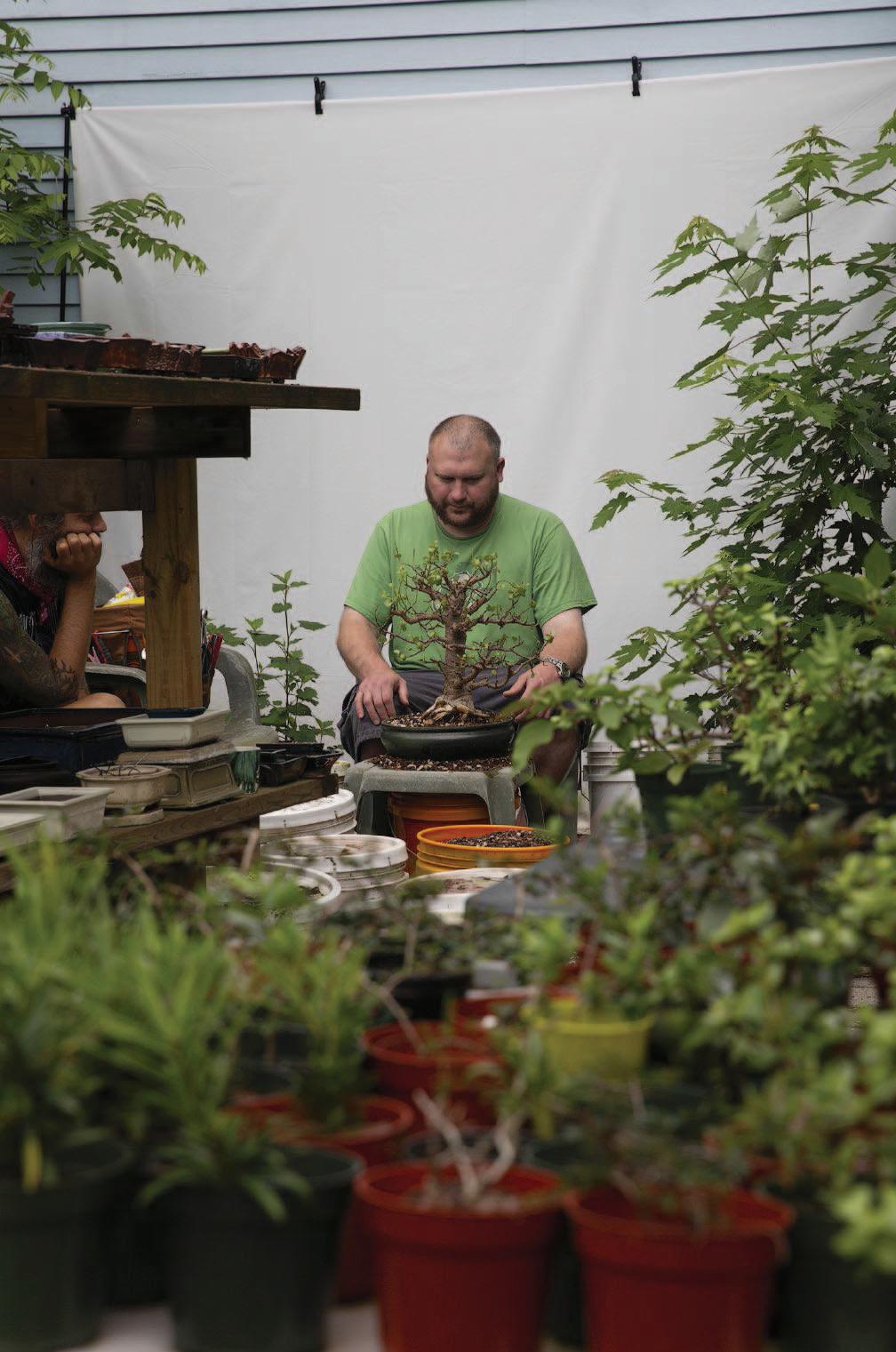
6 minute read
Home-based companies fill a niche
by Smckenna
Cut your own at Clover Meadow
During the coronaviruse pandemic, lifelong gardener McNamee came up with the idea of welcoming people to her Clover Meadow Farm to cut their own flowers and take home an arrangement.
Advertisement
Americans were urged to explore the outdoors during the COVID stayat-home orders: While McNamee agrees hiking and similar pursuits were beneficial, she said they were not for everyone.
“People needed something else, and I wanted something familyfriendly (and) accessible, where people can learn about flowers and plants and arrangements and take joy in that,”said McNamee, who moved to Claremont with her husband, Thomas, five years ago.
With not a lot of money or time to invest —McNamee has a full-time job as a transportation dispatcher — she put her idea on local Facebook pages.
“The first year (2021), I just wanted to see if there was an interest,”McNamee said, pointing out snapdragons and zinnias coming up in the beds dotting her small property. “I was really taken aback by how people responded so positively. I almost doubled my sales last year from the first year, and I anticipate doubling again this year. I have customers that come from Weathersfield, Sunapee and Charlestown.”
This summer, McNamee, who also delivers arrangements to customers, has added a few workshops on floral bouquet building, and she updates customers on what is available in a newsletter. She received assistance from the Agricultural Viability Alliance, which partners with the White River Junction-based nonprofit Vital Communities, to help her design and build a website.
“That was extraordinarily helpful,”McNamee said.
McNamee strongly believes that flowers can have therapeutic value. One of her goals is to learn botanical therapy training and offer her services to people in recovery and to mental health nonprofits.
As McNamee walks among the flower beds on her quarter-acre farm, the joy she gets from gardening is in evidence.
“I just love it,”McNamee said more than once as she points out pe-
FAST with
Savings Bank of Walpole is proud to support local businesses in our community—which is why we offer products and services to help you succeed. And with SBW Express Business Lending, you can get the funds you need to manage your business faster and without a trip to the bank.



At SBW, you’ll always enjoy flexible terms, local decisions and the expertise of our Commercial Banking Team. It’s what we call the SBW Local AdvantageSM .
onies, delphiniums and oriental lilies among the 25 varieties of flowers she grows.
“I am growing 250 zinnias from seed. I’ll be putting in 300 gladiolas and 150 lilies today,”she said, excited for a day ahead in the hot sun one afternoon. “I try to have continual blooms spring through fall.”
Customers can take home a bouquet prepared by McNamee while others will cut their own.
“I encourage it, because it is a great way to get out and learn about flowers,”McNamee said. “I love it and love to see people come and watch their faces and their shoulders relax and I hand them snips and give them a bucket and tell them to go have fun.”
Clover Meadow also has a fencedin “children’s garden”that offers children accompanied by an adult the opportunity to fill a basket of fresh vegetables for $5.
“Many live in places where they can’t grow anything, so it gives them an opportunity to come out and experience what it is to pick your own vegetables, take them home and make something,”McNamee said.
McNamee works an hour or two in the morning and on weekends in her flower beds, calling it a “labor of love”more than a thriving home business.
“You don’t make a ton of money from farming,”she said.
Her advice to anyone thinking about a home-based business is to start small.
“Find something you love and test it out first,”McNamee said. “Don’t jump in with a website right away. If people are interested, they will find you and buy your products.”
From hobby to home business
Twenty years ago, Besserer discovered that he loved growing bonsai. Around 12 years ago, he started a home business to sell his creations to offset the cost of his hobby.
“I figured if I could sell some trees, I could make up for the cost of soil and other things,”Besserer said while seated outside his home in a small fenced-in area where he estimates he has about 400 bonsai trees of various species and stages of growth. “It pays for itself, and I get a little extra.”
Bonsai —a Japanese term that translates into “potted trees”—is defined as artificially preventing an ornamental tree or shrub from growing to its normal size.
Besserer said he was inspired after seeing the movie “The Karate Kid,”which has several scenes in- volving bonsai. He learned by experimenting and reading about growing bonsai.
“It is not much different than growing your typical house plant, but it does take a lot of patience,” Besserer said.
In the middle of his garden is a table with a variety of 1-year-old trees that Besserer grew either from cuttings or from seed.

“These are off to a good start after a year, but for most it will take three, four, five or six years before I can get a nice look out of them,” Besserer said. “That is a dilemma in making this a career: the time gap.”
Besserer grows the vast majority of the trees he sells but buys some for customers who want more mature specimens.
“Most people are happy paying $30 for a 1-year-old tree they can grow,”he said.
“If I want to try a new species, I might order one online, grow it out for a while and try my best to get cuttings from that,”Besserer said. “I’m fascinated by the different species.”
When he started selling bonsai, Besserer set up at farmers markets and arts markets and tried Facebook marketing. Today, he relies on people doing Google searches to find his website.
As for growth, Besserer, who is between jobs, said his business is limited by how much space he has. He recently bought a kiln and wants to make his own clay pots, which will further reduce his costs.
“I like to just see a tree start from a little cutting and, five years later, you have something that is really nice,”Besserer said.
‘My fudge maker just backed out’
Susan and Michael Sadonsky were not thinking of a home-based business when they moved back to Claremont July 2001. Former candy store owners in Claremont who moved to Florida in the 1980s, Susan said their son’s tuition payments were coming due, and they knew they needed additional income from Michael’s full-time job while Susan searched for work.
They got back into the food business thanks to a chance encounter Susan had in August 2001 at a gift shop in Bedford, N.H., while shopping for items for their home. Waiting to check out while the owner was on the phone, Susan grew impatient.
“She hung up the phone, turned to me and said, ‘I can’t believe my fudge maker just backed out on me. That was my biggest seller,’”Susan recalled. “I introduced myself and said I was not the fudge maker; my husband is.”
Susan convinced her husband it was an opportunity worth considering. They named the company Mountain View Fudge for the views of Ascutney and Okemo from the Claremont home they were renting.
“We started supplying her in August, and it just kept growing from there,”Sadonsky said.
Looking for ways to expand the business, Sadonsky said they joined a Microcredit N.H. group in Newport of six to eight people with small businesses. Microcredit was a program of the nonprofit New Hampshire Community Loan Fund that assisted self-employed people and microbusinesses with skills training, loan capital and networking.
“I was told if I wanted wholesale accounts, I needed to do the Made in N.H. Expo,” Sadonsky recalled.
Mountain View had a booth at the 2002 Made in New Hampshire Expo, which drew about 25,000 people and sent them on their way.
Today, Mountain View Fudge and Kettle Corn supplies eight retail locations in central and western New Hampshire and sells fudge at craft fairs and other events. Mountain View also offers fundraisers to schools and other groups.
Michael makes the fudge —of which there are more than 40 flavors —while Susan labels and delivers the products and sets up booths at events.
Their home business was reverse-engineered. They initially rented space near Mulberry Street before briefly moving to a storefront on Washington Street. Then in 2006, the Sadonskys decided to move to their home to reduce their overhead.

Making the fudge does not require a lot of space. A large stainless steel mixer sits on a table in the kitchen, with the retail containers and ingredients on a shelf below and in the refrigerator.
Sadonsky said anyone thinking about a home-based business needs to realize there is no leaving the office.
“The only downside of it is you go to bed at night looking at it and you wake up in the morning looking at it,”Sadonsky said with a laugh.
Careful record-keeping is also important because an area in a home designated for a business can have tax deduction advantages, if done properly.
What is common among McNamee, Besserer and the Sadonskys is that they chose something that they love doing, not because someone convinced them they could get rich doing it. That can often be the difference between success and closing up shop after a few years.
Patrick O’Gradycan bereached at pogclmt@gmail.com.









